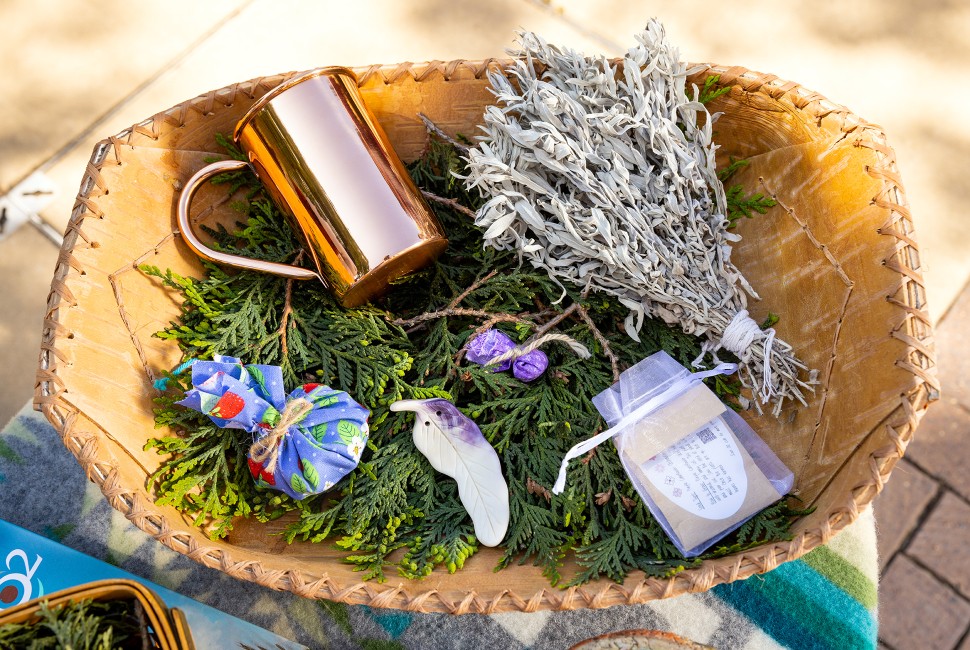The inauguration of Northwestern President Michael H. Schill will feature a series of symbolic and meaningful Native American traditions honoring the local Native American community, veterans and the president himself.
“Moments like this help propel us to a future where Indigenous practices are not only welcomed but also protected,” said Jasmine Gurneau, director of Native American and Indigenous Affairs at Northwestern. “The inclusion of ceremonial practices is profoundly significant as Indigenous Peoples did not have the right to practice their ceremonies in the U.S. until the mid-1970s.”
Northwestern Now highlights four aspects of the June 2 ceremony that will pay tribute to Native and Indigenous traditions.
Eagle staff leads the procession
Eagles and their feathers are considered sacred in Native culture and spiritual traditions because they fly the highest and carry prayers to the Creator. Eagle staffs honor veterans today and from the past. The staff — a long wooden stick — enters before all flags and clears the way forward, protecting, honoring, and representing Native American culture and community strength.
The procession will be led by the Chicago Native American Eagle Staff, and the staff bearer is Vincent Romero, Pueblo of Laguna, U.S. Navy. The staff represents the stature and honor of the Chicago urban Native American community. It was made more than 10 years ago through a community-engaged design and creative process, carved by a Ho-Chunk elder and adorned with eagle feathers donated by members of the community.
Native American equivalent of the national anthem
In recent years, nearly every Native American tribe has composed a flag song, dedicated to those who have served in the armed forces in various wars. These flag songs are the Native American equivalent of the national anthem, and those in attendance are asked to remove their hats and stand as they are able.
The Otoe-Missouria Flag Song was composed more than a century ago for returning veterans of World War I. It will be performed by the Oka Homma Singers: Niyol Spencer, Mississippi Chata/Diné; Dave Spencer, Mississippi Chata/Diné; Jordan Gurneau ’26 PhD, Ojibwe; Paul Molina, Kickapoo; Holly Spencer.
Singing in honor of the occasion
Honor songs are requested and sung to express honor to a specific person, community group, event or sacred item. As with the flag song, it is customary for attendees to remove their hats and stand as they are able to show respect when an honor song is performed.
The honor song, also performed by the Oka Homma Singers, recognizes the occasion of the inauguration of President Schill. From the Pawnee Nation, it is composed with vocables, which are syllables or sounds used to frame words.
Gifts between president and Indigenous communities
This gift exchange represents reciprocity and kinship between the president and the Indigenous communities. In Anishinaabe culture, parties fulfill the social expectations of kinship and agree to maintain a reciprocal relationship of mutual assistance and responsibility.
Megan Bang ’09 Ph.D., Ojibwe, director of the Center for Native American and Indigenous Research and professor of learning sciences in the School of Education and Social Policy, will present to President Schill a custom beaded medallion in purple and white with the Northwestern “N.” As is tradition, it will be offered to the president four times before he accepts — to ensure careful consideration.
In exchange, President Schill will present a birch bark basket filled with a copper mug representing water as the source of all life, wild rice representing sustenance, seeds representing our hopes for the future, and wampum shells representing Indigenous sovereignty and self-determination.


